4 things we learned at CDP Week 2020
This year at CDP Week we looked at the cross-industry trends shaping customer experiences. Here's the recap.
This year at CDP Week we looked at the cross-industry trends shaping customer experiences. Here's the recap.
This year, 5,000 attendees logged on to CDP Week, our virtual, four-day conference to discuss current and emerging industry trends.
Speakers from Forrester, Vice, IBM, and Instacart (to name a few) weighed in on the ripple effects of Covid-19 and the urgency of digital transformation across industries.
Discussions focused on the many ways that 2020 has been a turning point – a final push toward “digital-first” business models – and what that means for companies moving forward.
Throughout the week’s keynotes, roundtables, and fireside chats, one underlying concept emerged: today, every company is in the business of customer experience
And in the digital era, it’s impossible to separate customer experiences from topics like consumer privacy, data integrity, omnichannel customer journeys, and internal buy-in.
Below are the four main takeaways from CDP Week, a blend of tactics, strategies, and product announcements to help companies navigate the shifting digital landscape.
Steve Casey, Principal Analyst at Forrester, shared insights from a Segment-commissioned study on how businesses can thrive in rapidly changing buying environments.
It’s no secret that customer journeys have gone digital, spanning multiple channels and devices. (In case you hadn’t heard already, 90% of web users move between devices to complete a task, and use up to three different devices daily.)
Companies now have the unenviable task of connecting these touchpoints to gain a complete view of the customer. In fact, Forrester found that turning “fragmented data points into comprehensive user records” was the top challenge companies faced when trying to use customer data for sales and marketing efforts.
So why are companies struggling to create a single view of the customer?
One of the main reasons is the lack of integration. This was the leading issue for survey respondents when asked why their CDP wasn’t helping them evolve with consumer expectations.
That’s why having a centralized customer data platform that easily connects to your existing technologies is essential. It preserves data integrity, saves engineering hours, and can be used to create alignment across teams.
At CDP Week, Segment also announced a new feature, Destination Actions, that will help with just that. Destination Actions strengthens the connection between different tools in your tech stack, allowing users to trigger actions in their downstream tools based on customer data.
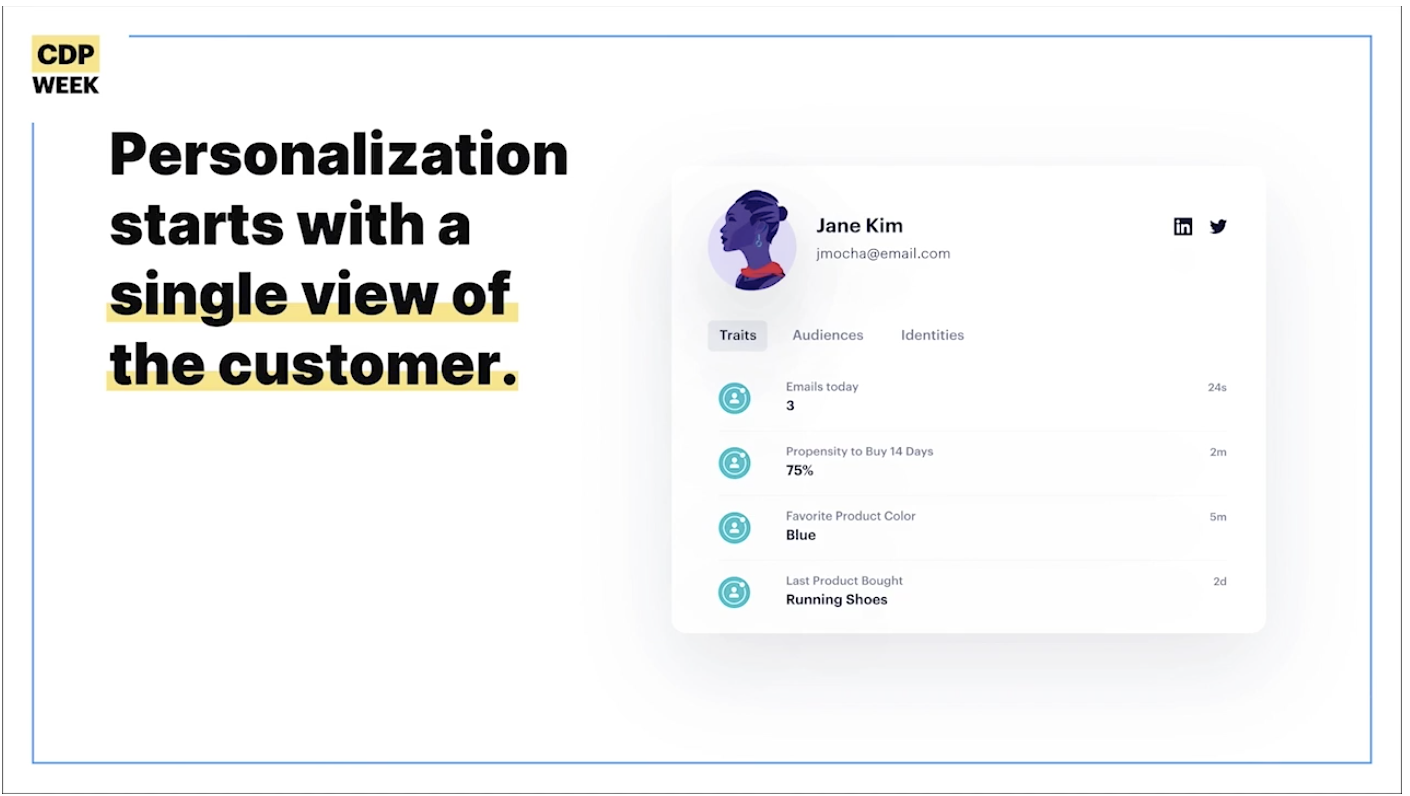
Meanwhile, Jennifer Stephenson, Vice President at Digital Hub, CSAA Insurance Group spoke about the benefits of having a consolidated, trusted source of data.
Their team had been grappling with frequent login issues to one of their platforms, MyPolicy, with hours spent trying to determine the root cause. But with Segment, CSAA quickly discovered the point of friction: data mismatches.
In minutes, the team could see if sign-in errors were due to user error (i.e. incorrectly inputting information) or the result of old data that had been brought over from legacy platforms.
With Segment Protocols, CSAA was able to flag data inconsistencies before they caused a snag in the customer experience. The team then took it a step further: using Personas to identify common challenges among customers and create ready-made solutions for specific audiences.
“Our partnership with Segment gave us the ability to gain insights into how our customers can and will use our platforms, and that was a game changer for us. One that enabled us to drive more effective solutions for both the business and IT.”
Peter Reinhardt, Segment’s CEO and co-founder, took a closer look at TikTok in his keynote presentation, The future of personalized experiences.
TikTok has been a social media phenomenon with astronomical growth; a case study for leveraging machine learning and behavioral data to elevate customer experiences. But the platform has also sparked international conversations on data storage, security, and privacy. In Peter’s words, “Data residency has become a geopolitical drama writ large.”
This year, the European Union invalidated Privacy Shields, which had enabled data transfer between European and US companies (impacting 5,000 organizations).
While Standard Contractual Clauses are still valid for data transfer, companies need to prepare themselves for more laws and regulations around data localization. Segment is making sure that customers can configure endpoints to ensure data is exclusively collected in a specified region – whether it’s the US, EMEA, or APAC.
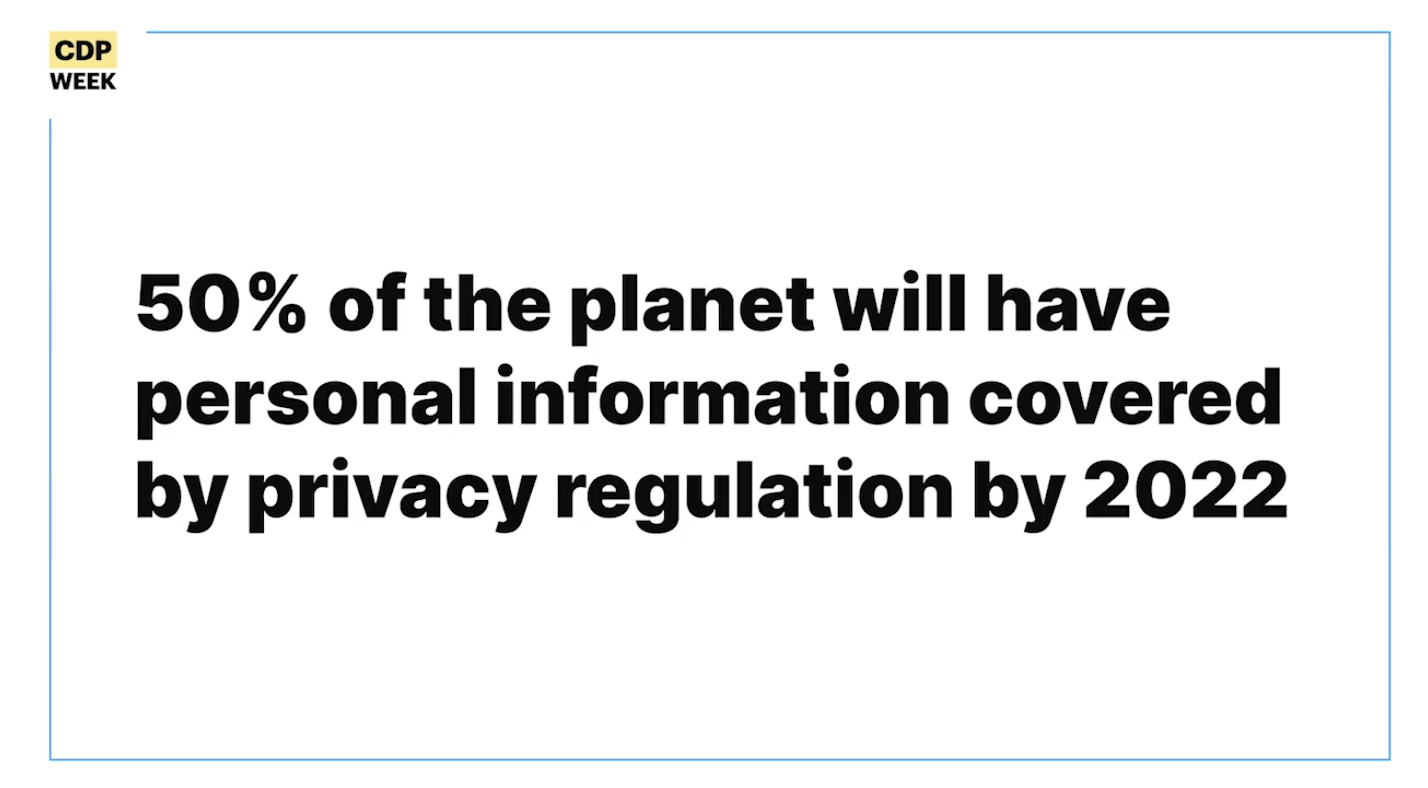
But it’s not just governments that are driving these privacy changes. Browser providers and tech companies are also influential players – giving rise to what many are calling “the death of the third-party cookie.” Cian Martin, Senior Corporate Counsel at Segment, talked about how first-party data was the strategic choice for companies:
“One of the great things about Segment is that we’re empowering companies to successfully rely on first party data. It allows companies to make a more personalized, respectful experience. If a consumer trusts the company, and trusts that it’s handling its data in a respectful manner, that relationship is going to last longer. And the only way to do that is with first party data.”
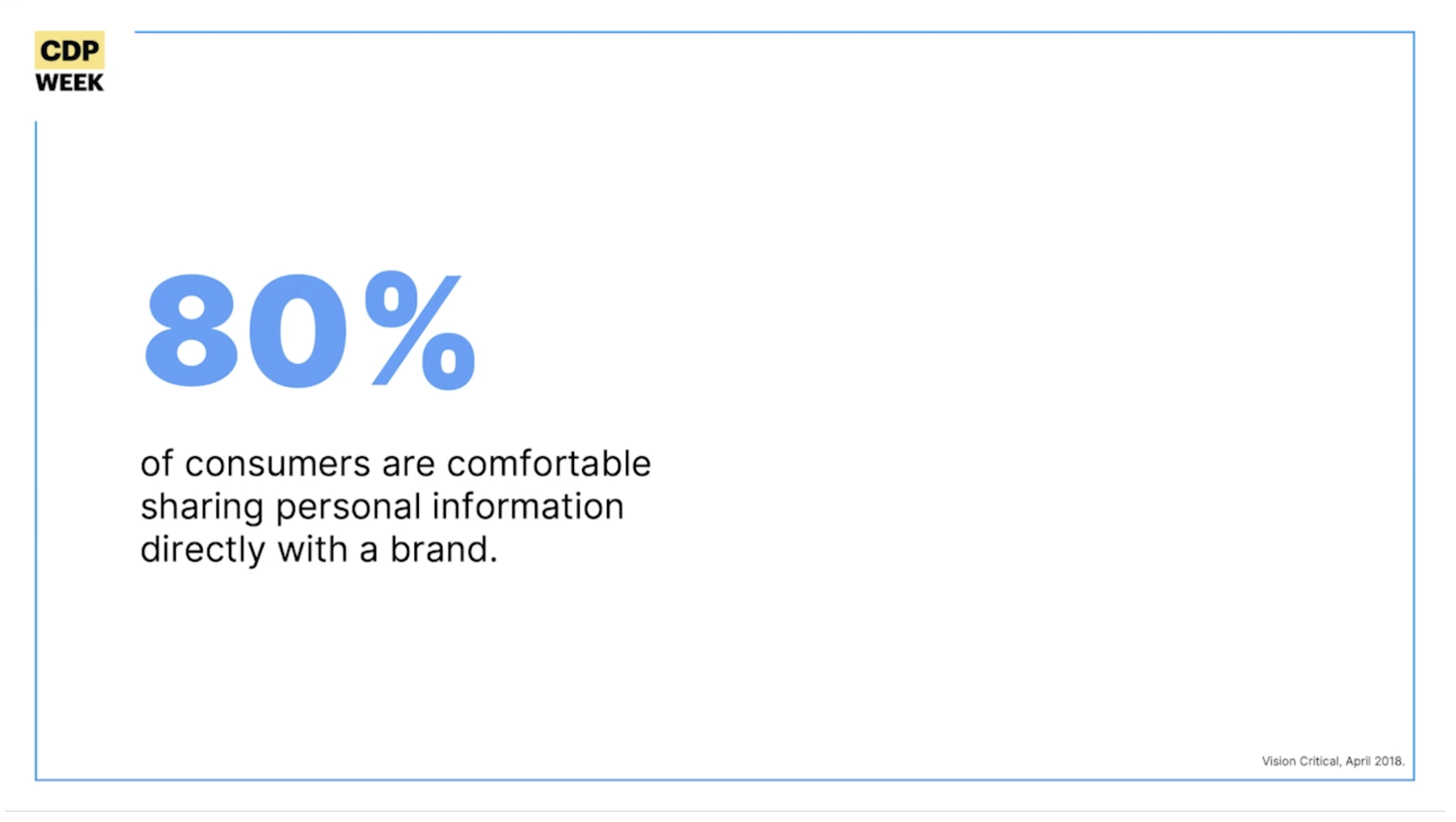
It was timely, then, that Segment announced In-Domain Instrumentation, to ensure data collection stays compliant as browsers implement Intelligent Tracking Prevention (ITP).
And while it hasn’t been put into effect yet, Apple will require developers to gain user permission before tracking behavior in apps. At Segment, we’ve already updated our Analytics-iOS SDK library to prepare for this change.
For highly regulated industries like insurance and healthcare, concerns around data privacy have stalled digital transformation – tethering businesses to legacy solutions that aren’t nimble enough to be competitive. But the truth is, companies can’t afford to wait, and migrating data to digital platforms shouldn’t carry the risk of non-compliance.
That’s why Segment also introduced new permission settings for Personally Identifiable Information (PII). Essentially, companies can control who has access to PII within the platform, without restricting product functionality.
Segment has always believed that data privacy is more than a legal obligation – it’s an ethical responsibility. It’s a point that was echoed by our CTO, Calvin French-Owen:
“We’re headed toward a more privacy conscious world, where every single one of us will have more rights to understand how our data is collected and how it’s used. And the best companies out there are going to be the ones who are leveraging this data responsibly. That’s why we’re taking proactive steps to make sure the right thing to do is the easy thing to do."
Jeff Lawson, CEO and Founder of Twilio, (which, you may have heard, recently entered an agreement to acquire Segment) explained how good data creates best-in-class customer experiences. With data, companies can better understand customers’ preferences, interests, and how they want to be engaged.
Because in today’s world, personalization is non-negotiable. And it’s also impossible without the right data infrastructure. This is clear in the struggle of CRMs to keep pace in the digital landscape. CRMs were built for manual data entry, and haven’t been able to handle the massive influx of digital data.
Companies need a scalable infrastructure that can handle this growing pool of behavioral data to offer real-time insights. Remember that personalization is time sensitive. Our CEO, Peter Reinhardt, touched on this connection between personalization, speed, and business longevity, saying, “Companies will only survive the continued transition to a digital-first world if they move fast enough.”
To accelerate and strengthen personalization efforts, companies are turning to machine learning to power recommendation engines and predictive insights. But the architecture needed to implement machine learning is complex, and can take months to build. This is why Segment launched Data Lakes, to offer customers a turnkey data foundation that’s cost-effective and time-efficient.
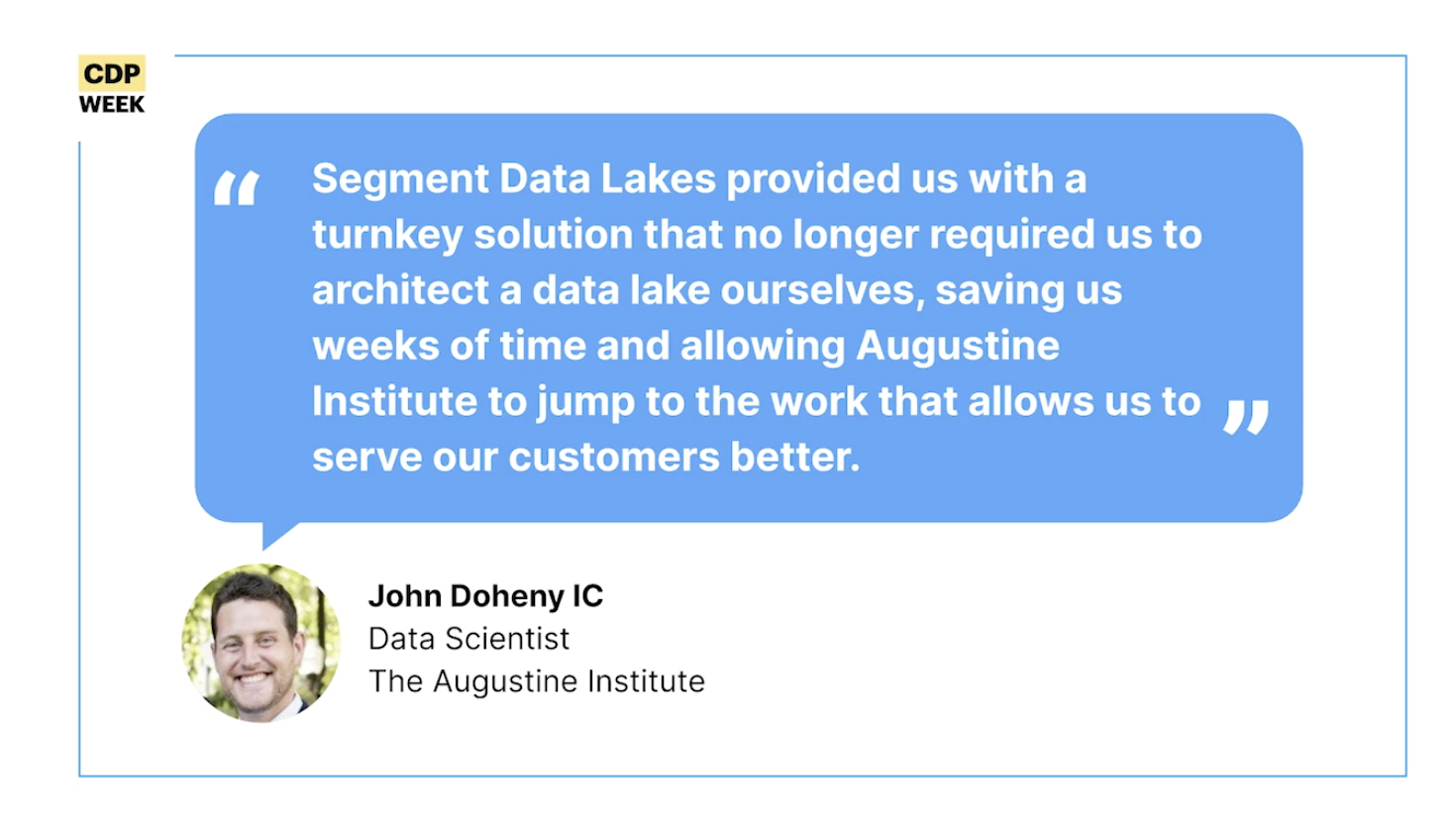
Companies that use CDPs consistently outperform those that don’t, and we have the data to prove it.
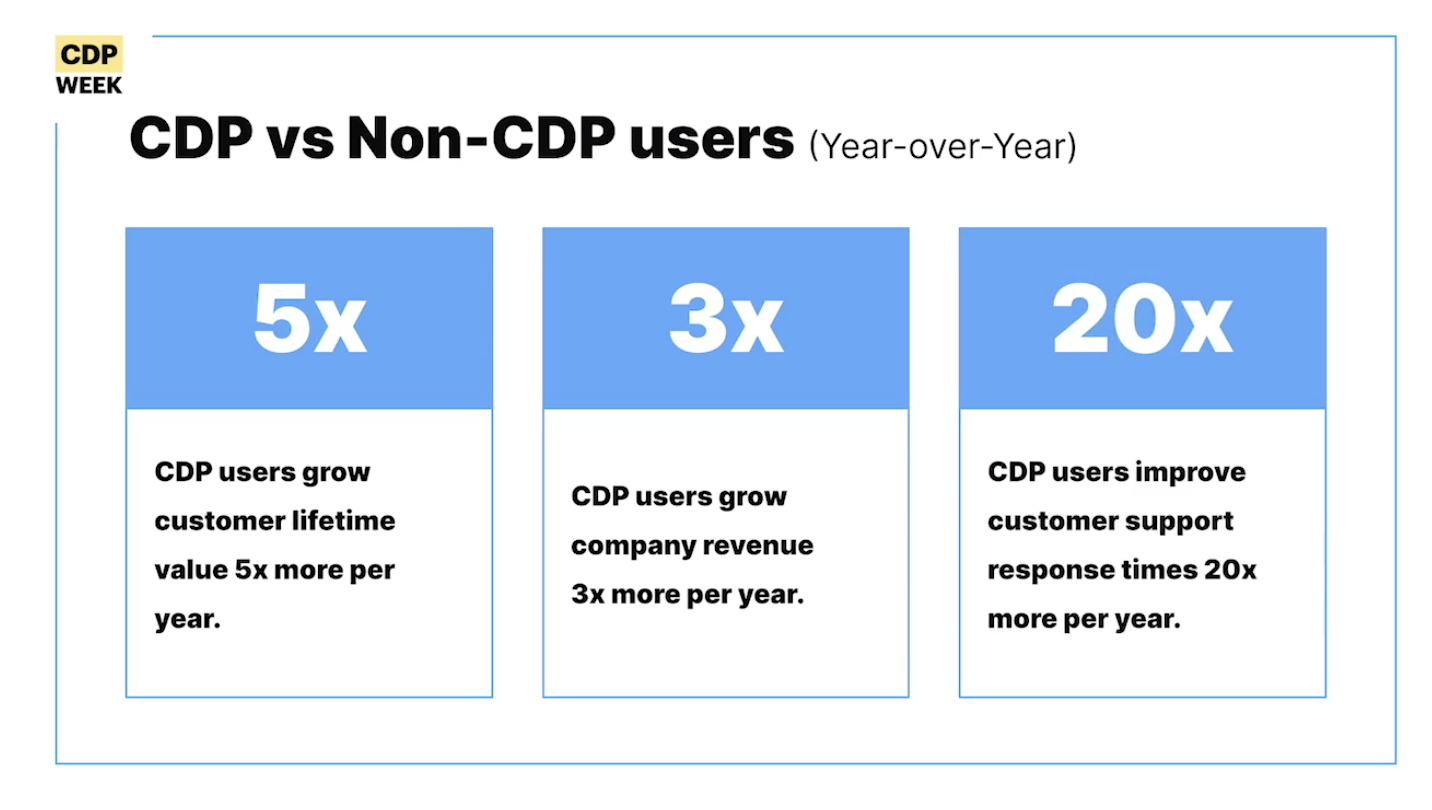
So, why are some companies still struggling to find CDP success?
More often than not, lack of adoption and miscommunication are to blame. To get the most out of a customer data platform, companies need to clearly identify stakeholders, demonstrate how KPIs and growth strategies are determined by data, and make sure this data is accessible (and easily understood) by non-technical team members (i.e. data democratization).
As you can see, we covered a lot of ground at this year’s CDP Week – and these are just the highlights. To dive deeper into these topics check out our recaps dedicated to days 1, 2, 3, 4.
Or register for free to watch all videos from the CDP Week here.
Until next year!

Our annual look at how attitudes, preferences, and experiences with personalization have evolved over the past year.